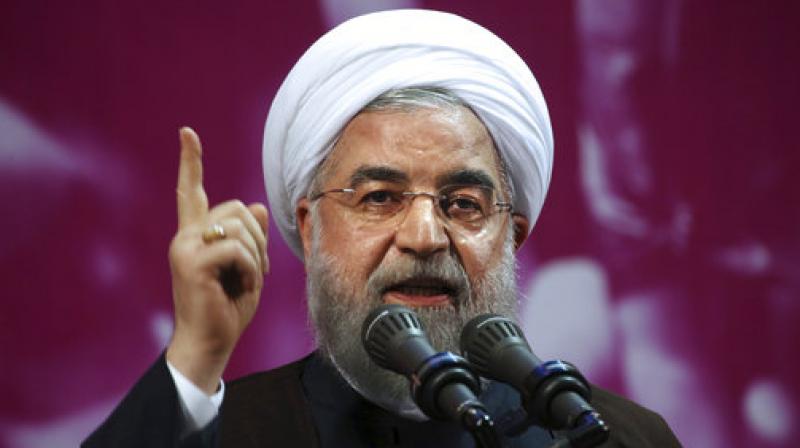Iran rejects any new nuclear deal proposed by US, France
Trump called the existing accord 'insane' and 'ridiculous', despite European pleas for him not to walk away.

Tehran, Iran: Iran's President Hassan Rouhani rejected any hopes of rewriting a nuclear deal with world powers Wednesday, after the leaders of the United States and France suggested a new pact covering Tehran's missile programme and regional interventions.
"We have an agreement called the JCPOA," said Rouhani in a fiery speech, using the technical name for the 2015 deal that curbed Iran's nuclear programme in exchange for sanctions relief.
"It will either last or not. If the JCPOA stays, it stays in full."
He was responding to statements in Washington by French President Emmanuel Macron and his US counterpart Donald Trump, in which they proposed a new deal with tougher restrictions on Iran.
Trump called the existing accord "insane" and "ridiculous", despite European pleas for him not to walk away, and demanded fresh curbs on Iran's ballistic missile programme and support for militant groups across the Middle East.
Macron said a new agreement should include a settlement on Syria, where Iran backs President Bashar al-Assad.
In Iran, Rouhani responded by ridiculing Trump, saying: "You have no expertise in politics, nor in law, nor in international accords. A trader, a businessman, a high-rise builder, how can he judge about global issues?"
Iran has the support of all other parties to the accord, who say it is working and Tehran has stuck to its commitments.
On Wednesday, EU diplomatic chief Federica Mogherini insisted the deal must be maintained.
"On what can happen in the future we'll see in the future, but there is one deal existing, it's working, it needs to be preserved," the former Italian foreign minister said as she arrived for a donor conference on Syria in Brussels.
Moscow also reiterated its support, with Kremlin spokesman Dmitry Peskov telling reporters: "We believe that no alternative exists so far" and demanding that Iran be involved in any further discussions.
Looming decision
Macron, who has built a warm rapport with Trump, has positioned himself as an emissary for European officials seeking a compromise that allows the mercurial US president to claim a public victory, while keeping the deal intact.
The Europeans appear to be hoping they can sell Trump on the idea of broader regional settlement with Iran that would complement, rather than replace, the existing nuclear deal.
"The biggest priority is maintaining the existing nuclear accord. It was negotiated by seven countries and the EU and can't be renegotiated by one or other party," said German foreign spokesman Rainer Breul.
"President Macron... spoke of the need for supplementary agreements. The question is whether, and in what circumstances, Iran would be ready to enter into such a process," he added.
German Chancellor Angela Merkel is expected to press the European case again when she visits Washington on Friday.
For now, Macron admitted he could still not read whether Trump would simply walk away from the existing deal when it comes up for renewal on May 12, as he has threatened.
True to his background in reality TV, Trump has kept everyone guessing.
"This is a deal with decayed foundations," he said. "We're going to see what happens on the 12th."
Iran has warned it will ramp up enrichment if Trump scraps the accord, prompting a blunt warning from the US leader.
"They're not going to be restarting anything. If they restart it, they're going to have big problems, bigger than they ever had before. And you can mark it down," Trump said.
Oliver Stone 'shocked'
The French president's pomp-filled, three-day visit was not welcomed by one long-time critic of US foreign policy, Oliver Stone, who happened to be in Tehran for a film festival on Wednesday.
The director told AFP he was "particularly shocked" to see Macron standing alongside President Donald Trump, calling for a revision of the nuclear deal.
"To see this young man, who doesn't have much of a sense of history or memory of the great traditions of France... was very depressing," Stone said.
Hawkish American officials take the opposite view -- that the Europeans, particularly Germany, oppose a tougher stance against Iran to safeguard their business interests there.
That is sharply rejected by European officials, who are increasingly frustrated at spending time handling Trump's complaints rather than focusing on the deepening crises of the Middle East.
The disagreement threatens to plunge transatlantic relations to their lowest point since the Iraq War, despite the lavish welcome Trump put on for Macron's state visit.
And meanwhile, Western countries have found themselves increasingly sidelined from issues such as the Syrian war -- underlined again on Wednesday when Iran, Russia and Turkey announced a new summit to discuss the conflict this Saturday in Moscow.

